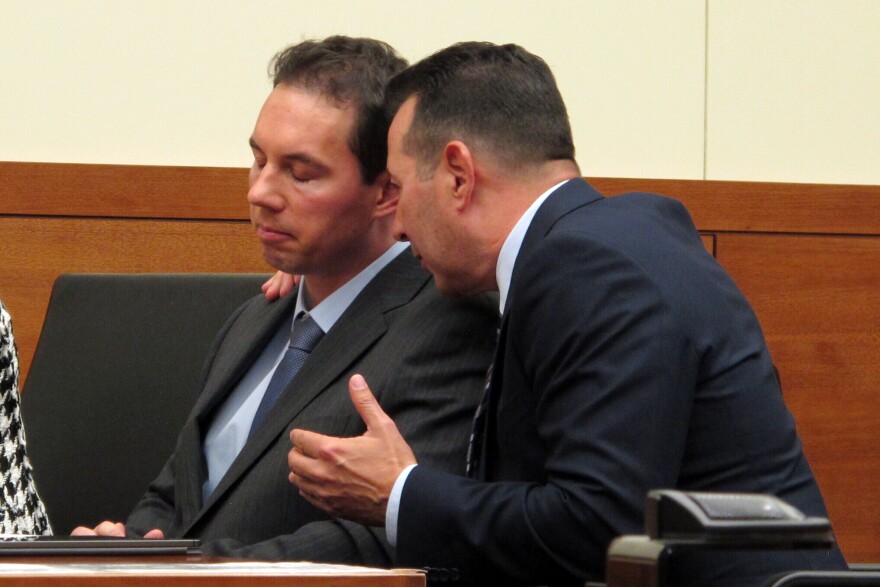Lawyers for former Mount Carmel doctor William Husel filed a motion on Tuesday to dismiss the murder charges brought against him.
Husel’s lawyer, Jose Baez, alleges that the hospital identified 16 additional patients who were given high doses of fentanyl by Husel, however these patients did not die for several days after receiving the dose. This runs contrary to the state’s claims that a dose of 500 mcg or more of fentanyl is lethal.
"It completely torpedoes the state’s case, and flies against every assertion made by the prosecution when they filed these charges," Baez told WOSU.
However months ago, Prosecutor Ron O'Brien said, "I have found no one, no where, that says 500 mcg of fentanyl is an appropriate use of fentanyl for treatment of someone being taken off a ventilator."
Husel was indicted by a grand jury for 25 counts of murder for giving 500 mcg to 2,000 mcg of fentanyl to near-death patients. He pleaded not guilty to the charges.
The motion to dismiss the charges discusses the case of a patient back in 2014 who allegedly received 2,500 mcg of fentanyl during her time in the hospital. However the patient did not die after the ventilator was removed. Instead she lived for 10 more days.
The motion to dismiss the charges discusses the case of a patient back in 2014 who allegedly received 2,500 mcg of fentanyl during her time in the hospital. However the patient did not die after the ventilator was removed. Instead she lived for 10 more days.
WOSU identified the patient as Tracie Young, 46, of Grove City Ohio. Young had a cardiac arrhythmia in late November of 2014, and by the time the ambulance reached her 20 minutes later, she had no brain activity. She was taken to Mount Carmel West, where she was put on a ventilator in the intensive care unit.
"She was still showing symptoms of pain all the time, no matter what they gave her," Tracie Young's sister, Kris Young told WOSU. "She would grimace, and moan, and squirm."
Kris Young is a retired nurse, and says her sister had a high tolerance to pain medications because she was put on opioids after a bad back surgery years prior.
She says her sister wouldn't have wanted to live on a ventilator, so Tracie Young was extubated and given 2,500 micrograms of fentanyl to make her comfortable. But she did not immediately die after the dose – instead, she was transferred to the palliative care unit.
“I do remember in palliative care one nurse telling me she had been there close to 20 years, and that she’d only known one other patient beside my sister that was able to have the pain medication and still show signs and symptoms of being in pain.”
Tracie Young died 10 days after recieving the dose, on December 3, 2014. Her sister Kris Young says the family was never notified of her sister’s involvement in William Husel’s case by law enforcement or the hospital.
“I don’t question the amount, honestly,” Kris Young says of the pain medication her sister received. “We wanted her to be as comfortable as possible. We knew that she was going to pass away and I wanted her to die with dignity, without pain, comfortably.”
The dose Tracie Young recieved was 500 mcg higher than the highest doses in Husel's murder charges. Yet Baez alleges Tracie Young's case, as well as 15 others, were not presented to the grand jury.
"This is really nothing short of a monumental miscarriage of justice," Baez says.
At the time of Husel's employment, the health system did not have any guidelines or a cap on pain medication during palliative ventilator withdrawals. Mount Carmel updated its guidelines in January 2019, after firing Husel.
Most hospitals don’t have a policy for palliative ventilator withdrawal because there is no agreed-upon maximum dose, experts say.
"There are no absolute limits to the doses of medication that we give," says Richard Leiter, a palliative care doctor at Dana Farber Cancer Institute and teacher at Harvard Medical School.
Leiter explains there’s no cap so the physician has discretion when providing comfort care, and can tailor treatment to the specific needs of the patient.
"Our goal is to make sure the patient is as comfortable as possible for the short time they have left," he says.
Despite that, Mount Carmel officials and the Franklin County Prosecutor’s Office argue that any dose of fentanyl higher than 500 micrograms is grounds for murder.
"500 sounds extremely high to me," Leiter says. "Although I could imagine there being situations where it could be appropriate."
Jared Rubenstein, a palliative care doctor at Texas Children's Hospital, says a large factor in determining the appropriate dose is opioid tolerance. If a person has been taking opioids for pain management, or even recreational use, they may require a higher dose to achieve the same pain management. He compares it to building up a tolerance to coffee.
"A dose of 500 micrograms to help someone be comfortable as part of a palliative extubation, who has demonstrated tolerance to fentanyl, would not be an unheard-of dose," Rubenstein says.
Franklin County Prosecutor Ron O'Brien said his office is reviewing the motion and will file a response with the court within 14 days.
In an emailed statement, a spokeswoman for Mount Carmel says, “Mount Carmel did a thorough investigation and we provided the results of the investigation to the appropriate authorities. As this is a matter between the defendant and the state, we will not comment on the criminal proceedings. ”



